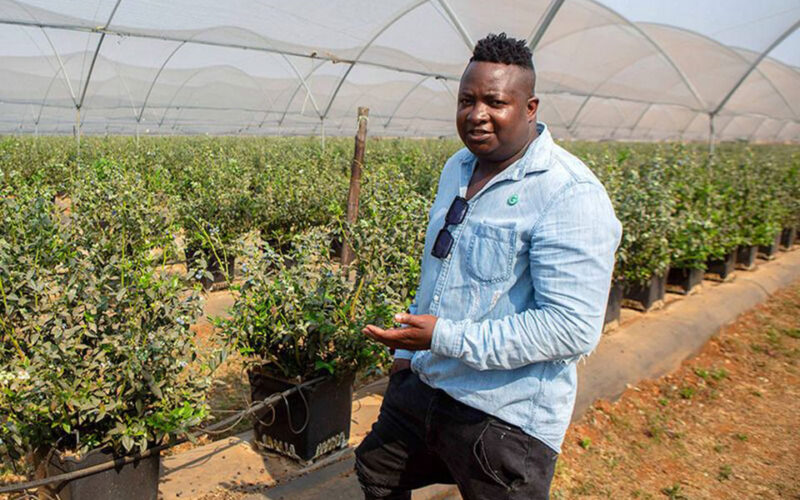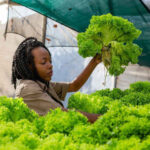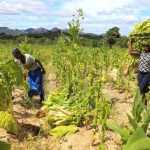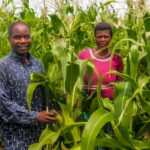TAFADZWA UFUMELI
CLARENCE Mwale looks like a rapper you wouldn’t want to have “beef’ with. His big frame, punk hairstyle, skinny jeans and large sunglasses are suggestive of a job in music, maybe even a nightclub. Mwale is anything but. Instead, he is the only licensed farm assurer for global accreditation in Zimbabwe, making sure export standards are met in that country and five neighbouring countries across the Southern Africa region.
Mwale’s journey in the business started in 2003 when he secured a temporary job at a farm produce export company in Harare. Young and armed with a degree in international relations and diplomacy, Mwale had wandered into the offices of Europegap to seek part-time work as he bade time for his “next big career move” in diplomacy. But that was never to happen. Within a few months of learning the intricacies of the farm produce export business, he was hooked – and soon embarked on a new career path.
“I was trying to figure out what to do so I went and joined this organisation and they said to me, ‘you are fresh out of school so can you try this for us?’ So I learnt slowly how to do the work and really enjoyed it and it became part of me, so I’d really say this job found me. I trained for something different and this job found me and brought me here,” he explained.
In 2007 he started his own company Fair Mark. It was during this period that he became the only licensed farm assurer in Zimbabwe and the neighbouring region.
Mwale’s Fair Mark company helps farmers in Southern Africa meet the stringent compliance standards required by export markets such as the EU and UK. The company also helps farmers and food factories interpret market requirements and become fully compliant.
To accomplish this feat, Mwale must travel thousands of kilometres, regularly visiting over 300 farms and food factories in Zimbabwe and neighbouring Mozambique’s Shona and English-speaking regions, as well as sections of four other countries. His position now demands that he works with fresh produce exporters across Southern Africa, including Angola. He has to visit each farm at least 5 to 7 times annually, a huge undertaking across such a vast area.
“I try and do two farms in the same region, it’s quite a cumbersome job, but it’s doable and we are doing it. I do 1500- 2000 kilometres every week, that’s how much I have to travel. That’s how much I have to be on the road, to be able to see as many farmers and food industries and I need to,” he said.
Before the controversial land reforms in the early 2000s, Zimbabwe had been considered Africa’s food basket, exporting large quantities of wheat, maize, tobacco and dairy productions to regional markets and Europe.
According to Trade Map, Zimbabwe’s export earnings to the EU in 2001 was around 795 million US dollars. But political uncertainty over the period forced the revenues to drop to 414 million US dollars. Today, a resurgent agricultural export sector across the region has Mwale helping farmers of peas, blueberries, mangoes, macadamia nuts and other fresh produce export their products to Europe.
Zimbabwe is a massively fertile country with a climate that provides huge advantages over the region’s agricultural giant, South Africa. Crops come into season at different times to South Africa, meaning farmers can export to their southern neighbour, or to Europe. Moreover, farming across the region is exploding, not just in Zimbabwe. Mwale travels across the region according to the seasons.
“I manage to achieve a lot with this job because the crops come into season in different times, In the beginning of the year, we do soft citrus so I will be with these farmers. When these come off-season, we then move to blueberry farmers. After this, I go briefly to Mozambique for chillies, litchis and mangoes and I then come back for the chillies in Zimbabwe” Mwale explained.
While produce marketers from Zimbabwe already have their growers, preferring established farmers, Clarence added that small-scale farmers are trying everything and anything to get access to new markets. For that reason, the company is planning to expand into logistics, starting with a packhouse. Next will come marketing and the company will then pay for the certification of out-growers.
“I like to see every farmer get a chance or opportunity to sell their products on the international platform- for me if we can all believe that we can do that, we can make it and we can change around the system, we can turn around this economy. The country’s agriculture was broken during the land distribution, however, now it’s back and everybody’s looking to export.”
[origincode_photo_gallery_wp id=”55″]














